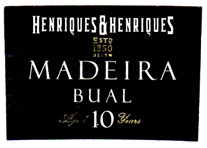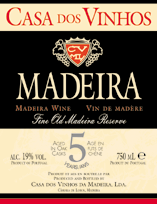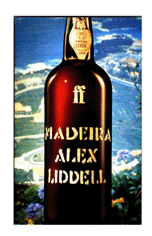![]()
Recent Articles
Archive of National Post Articles
![]()

Weekly Wine & Spirits Columnist - Michael Vaughan
Madeira
~ The
Great After-Dinner Gem©
Note
that this unedited version includes a list of Madeira available at
the SAQ
And a Backgrounder to Madeira Itself!
National Post • Saturday, October 7th, 2000
It’s the eve
of Thanksgiving and time to break out the sweeties. Last week I loyally
dwelt on the possibility of sipping a good Canadian maple liqueur or great
dessert fruit wine after your dinner.
This week, I
travel abroad to one of my favourite destinations - the remote island of
Madeira. Of all the dessert wines in the world, nothing lives as long as
Madeira. It’s one of my favourite libations and every year I pause and
give thanks to the countless souls whose efforts have made this wine
possible.
For these were
the impoverished, hardworking individuals whose families have carried the
heavy baskets of grapes up and down the steep island slopes for
generations. And for pittance. Indeed, when I first visited Madeira in
1976, poverty was not only omnipresent; it was an accepted way of life.
Of all the
wines, perhaps with the exception of Port, the immense effort required to
make a single bottle is enough to make any mortal give thanks. Of course,
the sheer remoteness of the island and fractured state of the industry has
helped contribute to its eclipse. From 30 shippers operating at the end of
the 17th century, there are only 8 today! The great irony is
that nobody knows about them. After all, how could they, they haven’t
been rated by Robert Parker Jr. nor do they have the big bucks to
advertise in the Wine Spectator.
The largest is
the Madeira Wine Company, which controls more than 20 brand names
including Blandy, Leacock, Cossart Gordon, etc. It was taken over by
Oporto’s Symington family, owners of a number of venerable Port houses,
in 1988.
Last year, when
for the first time in memory (or at least since 1968) there was a tasting
of fine old Madeira’s in Toronto thanks to the efforts of the tiny house
of Henriques & Henriques. I was stunned to taste 100-year-old - which
was absolutely delicious. Unfortunately, the only Madeira to appear in the
LCBO’s three 2000 Classics Catalogues was a 1900
Verdelho (named after the grape variety) which is now sold out. To
address this woeful situation you will have to visit La Belle Provence.
Montreal’s SAQ Signature
store, for instance, has more than a dozen Madeiras including 1850,
1895, 1900, 1912, 1922,
1957 and 1963 (see
listings at end of article).
 Thankfully
at Vintages, a small but steady stream has appeared. Of the five released
this year, the most recent and best-priced was in September featuring an
excellent example from one of the few remaining respected houses. Henriques & Henriques Bual Aged 10 Years is an excellent buy at
$34.65 and is not to be missed. The lovely, complex, sweet baked fig,
butterscotch and hazelnut flavours linger on the palate, a sublime
after-dinner treat. In fact, it’s dirt-cheap when compared to a Port of
a similar quality. Some 60 bottles remain within the Toronto area – call
the LCBO Infoline at (416) 365-5900 to the store closest to you. You
might try calling the Canadian agent Miguel Jardim,
who happens to be the son of one of the company’s original partners at
(416) 488-0851.
Thankfully
at Vintages, a small but steady stream has appeared. Of the five released
this year, the most recent and best-priced was in September featuring an
excellent example from one of the few remaining respected houses. Henriques & Henriques Bual Aged 10 Years is an excellent buy at
$34.65 and is not to be missed. The lovely, complex, sweet baked fig,
butterscotch and hazelnut flavours linger on the palate, a sublime
after-dinner treat. In fact, it’s dirt-cheap when compared to a Port of
a similar quality. Some 60 bottles remain within the Toronto area – call
the LCBO Infoline at (416) 365-5900 to the store closest to you. You
might try calling the Canadian agent Miguel Jardim,
who happens to be the son of one of the company’s original partners at
(416) 488-0851.
Also, keep your
eyes open next Saturday as 50 cases of Pereira D’Oliveira 1973 Verdelho ($69.85) hits the shelves. It’s
very intense, complex, mouthfilling, zesty, chocolaty, date,
caramel-toffee flavours go on and on. Another hit is the wonderful Justino Henriques 5 Years Old Madeira Reserve ‘Broadbent Selection’ at
$19.75 per half bottle. A tiny amount still remains in the system and it
is definitely worth finding.
 Failing
to find any of these high rollers, the LCBO general list features the old
reliable Casa Dos Vinhos Fine Five
Year Old Malmsey (the sweetest of the Madeira) at $17.55. It’s
perfect for sipping or spicing up special sauces.
Failing
to find any of these high rollers, the LCBO general list features the old
reliable Casa Dos Vinhos Fine Five
Year Old Malmsey (the sweetest of the Madeira) at $17.55. It’s
perfect for sipping or spicing up special sauces.
 My holiday
weekend suggestion is that you pick up a bottle along with great book -
Alex Liddell’s Madeira. This
newly-release soft cover by Faber and Faber ($30.99 at the Cookbook Store)
is the absolute last word on this wonderful dessert wine. It is perhaps
the most enlightened, honestly written wine book I have ever come across.
All the commercial bunk that fills most of today’s trite works has been
swept under the carpet. It’s a fascinating read.
My holiday
weekend suggestion is that you pick up a bottle along with great book -
Alex Liddell’s Madeira. This
newly-release soft cover by Faber and Faber ($30.99 at the Cookbook Store)
is the absolute last word on this wonderful dessert wine. It is perhaps
the most enlightened, honestly written wine book I have ever come across.
All the commercial bunk that fills most of today’s trite works has been
swept under the carpet. It’s a fascinating read.
Next week I will be revealing the gems of Saturday’s Vintages release, so stay tuned.
Backgrounder: What is Madeira Wine?
Madeira
wine is a still, fortified, blended wine that can be wonderfully
concentrated and complex. The
best Madeiras are aged in the wineries for many years in 650-litre casks
of oak, satinwood or mahogany, in sun-baked attics.
Huge sealed heating vats are used to age the lesser wines, which
are later blended to achieve the final effects.
The extensive heating and aging before
bottling means that exposure to air is unlikely to damage the wine once
the cork is drawn. Madeira is
one wine that can be enjoyed glass by glass for months. The names of the finest types of Madeira wine are taken from
the four principal kinds of grapes grown on the island of Madeira:
Malmsey, Bual, Verdelho and Sercial.
Each of these named Madeiras must be made 100% from the named
varieties.
Malmsey:
Malmsey is an extremely rich and luscious wine with a fine bouquet.
With age it becomes spirituous and develops the character of a
liqueur. The vines of the
malmsey grape require a dry soil and intense heat and the grapes are not
gathered until they have become slightly sun-dried.
Malmsey is essentially a dessert wine, but for those with a sweeter
palate it can also be enjoyed before meals.
The darkest of the Madeiras, malmsey is raisiny-fruity, full
bodied, fragrant, very rich and sweet.
It is a rich, pungent exotically flavoured wine with refreshing
acidity.
Bual:
Bual wine is a full, rich Madeira,
medium-coloured and fragrant. Best served as a dessert wine after meals and considered to
be the most complete and best-balanced wine produced in Madeira. Medium to
dark brown, full bodied, fragrant and fairly sweet Verdelho: Verdelho is a
medium-rich golden wine with a dry finish.
This is an excellent “all-purpose” wine as it can be taken
before or after meals and can also be served with soup.
Verdelho:
Verdelho starts out in life golden coloured, medium bodied and
medium-dry, it has good acidity, and at best has an apricot, nutty
flavour, tasting drier with age. Very nutty, fragrant and medium dry.
Sercial:
Sercial is a pale-dry nutty Madeira wine.
The vines producing the grapes for this type came originally from
the Rhine (other kinds were imported from Crete).
With the influence of the soil and sun of Madeira the original
Riesling grape acquired somewhat different characteristics.
When young, Sercial is a harsh wine, but with age it mellows and
develops a distinctive nutty flavour.
As a dry wine it is an excellent aperitif. It is pale and dryish
with lightish body and good acidity, aging to austere, nutty flavour and a
medium-dark colour.
Blends:
Apart from these traditional wine types, there are others, which
are blends. Among these is Monte Seco, the driest, lightest and palest of Madeiras, resembling
almost a Fino sherry, but with the added fragrance and “nose” of a
Madeira. There is also Rainwater, a medium dry Madeira somewhere between a Sercial and a
Verdelho.
The
Young Madeiras: Since the phylloxera bug
decimated Europe’s’ older vines at the end of the nineteenth century,
many of the young Madeiras (5 years and less) are made using the Negra
Mole grape, a local version of Pinot Noir.
The wine maker’s skill will produce a wine of the malmsey type,
the Bual type, etc., but by law the wine cannot be named by the grape
variety unless it is 100 per cent of that grape.
Instead they are labeled sweet or full rich, medium sweet or medium
rich, medium dry and dry. Generally speaking, they have the similar Madeira
characteristics as regards “nose”, lushness and acidity, matching the
four main types in all but traditional name.
Madeiras
Available at the SAQ
Bual
Madeira 1922 demi-doux 20%, vin de liqueur (v.d.l.),
750 ml, 878397, 395,00 $, E (S)
Cossart
Gordon Madeira Bual 1963 doux 17.5%, vin de
liqueur (v.d.l.), 750 ml, 892828, 225,00 $, E (S)
Cossart
Gordon Madeira Bual 5 Ans
demi-doux, vin de liqueur (v.d.l.), 750 ml, 328070, 23,05 $, (S)
Leacock's
Rainwater Madeira Demi-Sec 17.5%, vin de
liqueur (v.d.l.), 750 ml, 245530, 17,55 $, (S)
Madeira
Monte Seco 19% Portugal, vin de liqueur (v.d.l.),
375 ml, 311084, 9,80 $, (S)
Madeira
Reserve 5 Ans 19% Portugal, vin de liqueur (v.d.l.),
375 ml, 364141, 11,60 $, (S)
Madeira
Sercial sec 19%, vin de liqueur (v.d.l.),
750 ml, 087585, 18,55 $, (R)
Malvazia
Madeira 1895 doux 20%, vin de liqueur (v.d.l.),
750 ml, 878421, 895,00 $, E (S)
Old Wine
Madeira 1957 demi-doux 20%, vin de liqueur (v.d.l.),
750 ml, 878389, 195,00 $, E (S)
Verdelho
Madeira 1850 demi-sec 20%, vin de liqueur (v.d.l.),
750 ml, 878439, 1,195,00 $, E (S)
Verdelho
Madeira 1900 demi-sec 20%, vin de liqueur (v.d.l.),
750 ml, 878413, 650,00 $, E (S)
Verdelho
Madeira 1912 demi-sec 20%, vin de liqueur (v.d.l.),
750 ml, 878405, 475,00 $, E (S)
N
nouveau P
promotion E offert à
la SAQ Signature
(C) cadeau (R) courant (S) spécialité
© Michael
Vaughan 2000.
Copyright Gargoyles Limited 2000
Toronto, Ontario
mbv@total.net